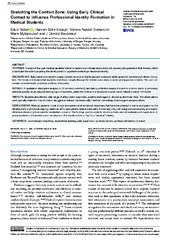| dc.contributor.author | Schei, Edvin | en_US |
| dc.contributor.author | Knoop, Hannah | en_US |
| dc.contributor.author | Gismervik, Malene | en_US |
| dc.contributor.author | Mylopoulos, Maria | en_US |
| dc.contributor.author | Boudreau, J. Donald | en_US |
| dc.date.accessioned | 2020-06-08T15:46:38Z | |
| dc.date.available | 2020-06-08T15:46:38Z | |
| dc.date.issued | 2019-04-26 | |
| dc.Published | Schei E, Knoop, Gismervik, Mylopoulos, Boudreau JD. Stretching the Comfort Zone: Using Early Clinical Contact to Influence Professional Identity Formation in Medical Students. Journal of medical education and curricular development. 2019;6:1-6 | eng |
| dc.identifier.issn | 2382-1205 | |
| dc.identifier.uri | https://hdl.handle.net/1956/22505 | |
| dc.description.abstract | Purpose: To explore first-year medical students’ affective reactions to intimate encounters with severely sick patients in their homes, within a curricular innovation targeting the development of a patient-centered professional identity. Background: Early patient encounters create complex emotional challenges and constitute fertile ground for professional identity formation. The literature indicates that students often learn, largely through the hidden curriculum, to avoid and suppress emotion. This can culminate in mental health problems and loss of empathy. Method: A qualitative descriptive analysis of 28 randomly selected, mandatory, reflective essays focused on a home visit to a previously unknown patient, in an unsupervised group of 4 students, within the context of a structured course called Patient Contact—PASKON. Results: Students described a wide range of affect-laden responses, positive and negative, elicited by the home visits. The observations were typically related to loss of control, struggles to behave “professionally,” and the unmasking of stereotypes and prejudices. Conclusions: Medical students’ initial clinical encounters elicit emotional responses that have the potential to serve as triggers for the development of emotional maturity, relational skills, and patient-centered attitudes. Conversely, they can foreground uncertainty and lead to defensive distancing from patients’ existential concerns. The findings point to a role for structured educational strategies and supervision to assist students in the emotion work necessary in the transition from a “lay” to a “medical” identity. | en_US |
| dc.language.iso | eng | eng |
| dc.publisher | SAGE Publications | eng |
| dc.rights | Attribution-NonCommercial CC BY-NC | eng |
| dc.rights.uri | http://www.creativecommons.org/licenses/by-nc/4.0/ | eng |
| dc.subject | communication teaching | eng |
| dc.subject | experiential learning | eng |
| dc.subject | peer supervision | eng |
| dc.subject | professionalism | eng |
| dc.subject | professional identity formation | eng |
| dc.title | Stretching the Comfort Zone: Using Early Clinical Contact to Influence Professional Identity Formation in Medical Students | en_US |
| dc.type | Peer reviewed | |
| dc.type | Journal article | |
| dc.date.updated | 2020-01-12T18:02:18Z | |
| dc.description.version | publishedVersion | en_US |
| dc.rights.holder | Copyright 2019 The Author(s) | |
| dc.identifier.doi | https://doi.org/10.1177/2382120519843875 | |
| dc.identifier.cristin | 1770930 | |
| dc.source.journal | Journal of medical education and curricular development | |

